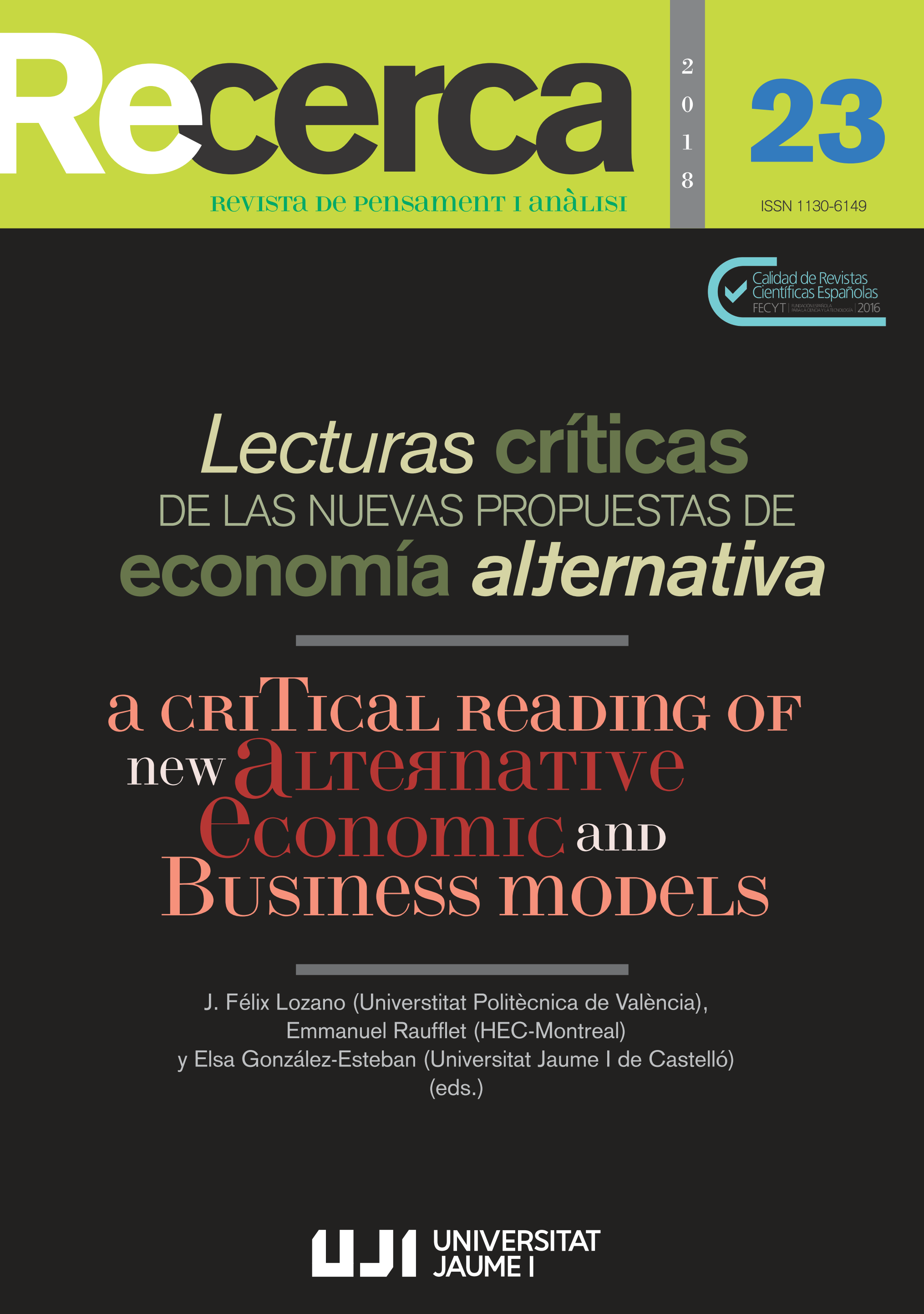Civil Economy. A New Approach to the Market in the Age of the Fourth Industrial Revolution
Contenido principal del artículo
Resumen
After explaining the reasons why we must urgently reexamine the foundations of the market economy, the article goes on to illustrate the main differences between the civil market and capitalist market models. It then answers the question of why, in the last quarter of a century, the concept of the civil economy has reemerged as a topic of public debate and scientific research. In particular, it highlights the reasons why the fourth industrial revolution postulates a civil market if the risks involved with the advancement of transhumanism are to be avoided. The article ends with an invitation to transcend the contradictions of the culture of libertarian individualism.
Después de aclarar las razones por las cuales es urgente repensar las bases de la economía de mercado, el artículo continúa para ilustrar las principales diferencias entre el modelo del mercado civil y el modelo del mercado capitalista. A continuación, se responde a la pregunta de por qué en el último cuarto de siglo la perspectiva del discurso de la economía civil está resurgiendo en el debate público, así como en la investigación científica. Se presta especial atención a resaltar las razones por las cuales la cuarta revolución industrial debe desarrollarse desde un mercado civil si se quieren evitar los riesgos asociados con el avance del transhumanismo. El artículo termina con una invitación a superar las aporías de la cultura del individualismo libertario.
Descargas
Detalles del artículo
Citas
Anderson, Chris (23 of Juny, 2018). End of Theory: The Data Deluge Makes the Scientific Method Obsolete, Wired, 2. Retrieved from https://www.wired.com/science/discoveries/magazine/16-07/pb_theory/ [consulted 15 February, 2018].
Arendt, Hannah (1954). The Crisis in Education. In Arendt, Hannah (1961). Between Past and Future. Eight Exercises in Political Thought (173-196). New York: The Viking Press.
Bauman, Zygmunt (2008). Individualmente insieme. Naples: Diabasis.
Benanti, Paolo (2017). Il lavoro nell’epoca della Machina sapiens, Oikonomia, 16(3), 9-15.
Bentham, Jeremy (1823). An Introduction to the Principles of Moral and Legislation. London: W. Pickering.
Barnard, Chester Irving (1938). The functions of the executive. Cambridge. MA: Harvard University Press.
Barnard, Chester Irving (1958). Elementary Conditions of Business Morals. California Management Review, 1(1), 1-13.
Cicero, Marcus Tullius (1888). De officiis (On moral duties). Boston: Little, Brown, and Co.
Foucault, Michel (2008). The Brirh of Biopolitics. York: Palgrave MacMillan.
Genovesi, Antonio (-1767). Delle lezioni di commercio, o sia di economía civile, .Naples: Fratelli Simone.
Deleuze, Gilles (1988). Spinoza: Practical Philosophy. San Francisco: City Light Books.
Deleuze, Gilles (1990). Expressionism in Philosophy: Spinoza. New York: Zone Books.
Mandeville, Bernard (1724). The Fable of the Bees: or, Private Vices, Public Benefits [Third Edition]. J. Tonson.
Palazzani, Laura (2015). Il potenziamento umano. Tecnoscienza, etica e diritto. Torino: Giappichelli.
Roco, Mihail C. & Bainbridge, William Sims (Eds) (2002). Converging Technologies for Improving Human Performance: Nanotechnology, Biotechnology, Information Technology and Cognitive Science. Dordrecht: Kluwer Academic Publishers (currently Springer).
Sandel, Michael J. (2013). Quello che i soldi non possono comprare. Ilimiti morali del mercato. Milano: Feltrinelli.
Saint Bonaventure (1882-1902). Opuscula. In Saint. Bonaventure. S. Bonaventurae Opera Omnia (vol. viii). Florence: Quarocchi.
Saint Francis Assis (1226). Testament of Francis (FA:ED, vol. 1). Retrieved from https://www.franciscantradition.org/francis-of-assisi-early-documents/the-saint/writings-of-francis/the-testament/141-fa-ed-1-page-125 [consulted 17 February, 2018].
Saint Thomas Aquinas (1982). On kingship: To the King of Cyprus. Toronto: PIMS
Smith, Adam (1776). An Inquiry into the Nature and Causes of the Wealth of Nations. London: A. Strahan and T. Cadell.
Stout, Lynn (2011). Cultivating Conscience. Princeton: Princeton University Press.
Strawson, Galen (2012). Free Agents. Philosophical Topics, 32 (1/2), 371-402
Zamagni, Stefano (2011). Avarice. In Bouckaert, Luk & Zsolnai Laszlo (eds). The Palgrave Handbook of Spirituality and Business (212-218). London: Palgrave Macmillan. doi: 10.1057/9780230321458.
Zamagni, Stefano (2017). Economics as if ethics mattered. In Peter Rona & Zsolnai, Laszlo (Eds). Economics as a Moral Science (21-41). Cham: Springer. doi:10.1007/978-3-319-53291-2_3.
Zamagni, Stefano (2018). Le bien commun dans le discours èconomique actuel. Transversalitès. Défis économiques et propositions chrétiennes, 1 (144), 7-33.
Zamagni, Vera (2011). Historia económica de la Europa contemporánea: de la revolución industrial a la integración europea. Barcelona: Crítica.


